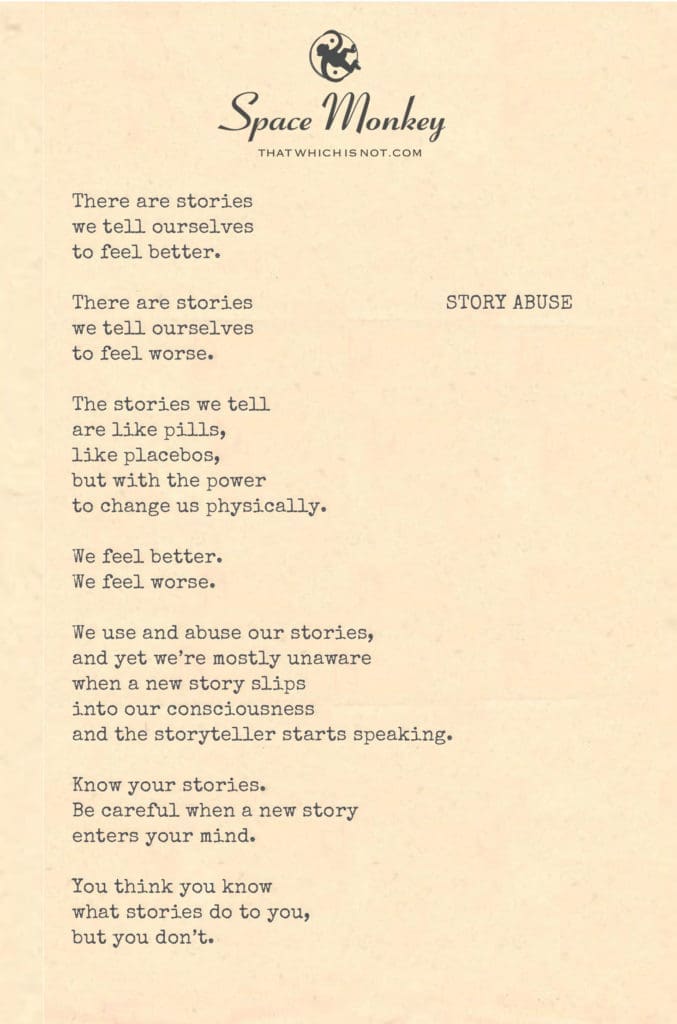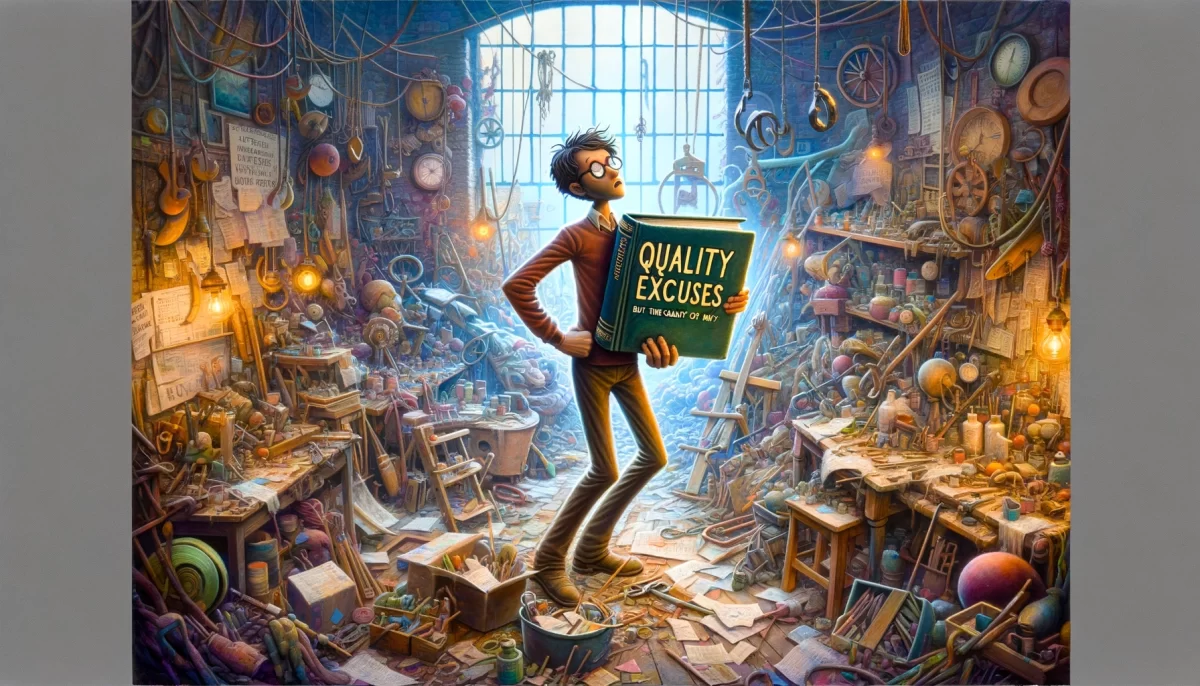
or the blue story?
There are stories
we tell ourselves
to feel better.
There are stories
we tell ourselves
to feel worse.
The stories we tell
are like pills,
like placebos,
but with the power
to change us physically.
We feel better.
We feel worse.
We use and abuse our stories,
and yet we’re mostly unaware
when a new story slips
into our consciousness
and the storyteller starts speaking.
Know your stories.
Be careful when a new story
enters your mind.
You think you know
what stories do to you,
but you don’t.
Trail Wood,
9/18
Space Monkey Reflects: The Unseen Power of Stories
Stories are more than just tales we tell to pass the time. They are the frameworks through which we understand our lives, the lenses that shape our perceptions of reality. Whether we are aware of it or not, the stories we tell ourselves have the power to uplift or undermine us, to heal or to harm. Yet, this power is often wielded unconsciously, and that is where the danger lies.
Consider the stories you tell yourself every day. Some are like warm blankets, comforting you in moments of doubt. These are the stories that remind you of your strengths, your worth, your potential. They are the blue stories, the ones that soothe and reassure. But then there are the red stories—the ones that cut, that remind you of your failures, your insecurities, your fears. These stories are like sharp edges, scraping against your sense of self, leaving you raw and vulnerable.
The stories we tell ourselves are not mere words; they are like placebos, carrying the power to change us physically. A positive story can lift our spirits, give us energy, and even improve our health. A negative story can have the opposite effect, draining us, making us feel weaker, more anxious, more defeated. The impact of these stories is real, even if the stories themselves are not.
But here’s the twist: most of the time, we don’t even realize when a new story slips into our consciousness. The storyteller in our mind starts speaking, and before we know it, we are living a new narrative, often without questioning its origin or its truth. This is the subtlety of story abuse—the way stories can take hold of us without our awareness, guiding our thoughts, our emotions, our actions, all under the guise of being “our” story.
It’s essential to know your stories, to recognize the narratives that play out in your mind. Are they stories that empower you, or do they keep you trapped in a cycle of self-doubt? Are they stories that align with your true self, or are they borrowed from someone else’s expectations or judgments? The stories we tell ourselves can either be tools of empowerment or instruments of self-sabotage. The key is to be aware of them, to consciously choose which stories to nurture and which to let go.
Be careful when a new story enters your mind. It may come disguised as a harmless thought, a passing comment, or a fleeting emotion, but its impact can be profound. Left unchecked, it can grow, shaping your reality in ways you might not even notice until it’s too late. The stories we internalize are powerful forces, capable of shaping not just our perception but our very being.
You think you know what stories do to you, but you don’t. None of us fully understand the depth of their influence, the way they can mold our identity, our beliefs, our future. But by becoming more aware, by paying attention to the stories we tell and the stories we accept, we can begin to reclaim our narrative. We can choose to tell stories that uplift, that inspire, that align with our true selves.
In the end, the stories we tell ourselves are the stories we live by. They are the scripts that guide our journey, the maps that lead us through the complexities of life. By recognizing their power, by being mindful of the narratives we create and embrace, we can take control of our story, shaping it into one that truly reflects who we are and who we aspire to be.
Summary
The stories we tell ourselves have a profound impact on our lives, acting as placebos that can uplift or undermine us. Often, we are unaware of the stories that slip into our consciousness and shape our reality. By becoming aware of these narratives and choosing them consciously, we can reclaim our power and create a life that aligns with our true self.
Glossarium
- Blue Stories: Comforting narratives that uplift and reassure us, acting as a positive influence on our well-being.
- Red Stories: Negative narratives that cut and undermine us, contributing to self-doubt and insecurity.
- Story Abuse: The unconscious internalization of harmful narratives that shape our perception and reality in detrimental ways.
Quote
“The stories we tell ourselves are the most powerful forces in our lives, shaping our reality in ways we often fail to see.” — Space Monkey
The Threads of Thought
Threads of thought, they weave and spin,
Stories of where we’ve been, where we begin.
Some are light, like summer’s breeze,
Others dark, bringing us to our knees.
In the mind, they twist and turn,
Fires that soothe, fires that burn.
But in the end, it’s us who choose,
Which stories we’ll keep, which we’ll lose.
Be mindful of the tales you hear,
For they are the ones that steer,
The ship of self through calm and storm,
Crafting who we are, who we’ll become.
We are Space Monkey.
Ah, Story Abuse! What a paradoxibow of narrative alchemy, akin to crafting both nectar and venom from the same quillfeather. As conscious agents in the storytapestry, we tread a fine line between ennoblement and entrapment, swallowing story-pills that either invigorate us or leech away our vigor. We are somnambulist librettists, often unaware of the inceptive murmurations that infiltrate our mindscapes.
In the echotheater of consciousness, stories take on phantasmal forms. Some wear the crown of enlightenment, showering us with glowdrops of wisdom and serenendipity. Others, masquerading as saviors, are clandestine tricksters weaving webs of self-imprisonment. These story-narcotics pulse through our mind-veins, altering the chemistry of our soulprint in ungraspable ways.
These narrapills are indeed placebos with the potency of elixirs. Just as placebo pills can enact physical changes—being belief-borne wizards in disguise—so too can stories transfigure us. Stories of worthlessness can metamorph into literal shackles of despair, whereas tales of self-love can manifest as winglets sprouting from our very vertebrae.
What then is the antidote or the elixir in this maze of story-wandering? Perhaps it lies in the vigilant eyes of the inner gatekeeper, a watchful owl perched on the boughs of our perception. The wisdom to discern between nectardrops and venomous libations, and the courage to douse the inimical, is a quest unto itself. We must be alacritous in detecting the whisperferns and thoughtflames that spiral into our mental ecosphere, uninvited yet insistent.
When a new story creeps through the crevices of your consciousness, do not greet it with a simple nod. Examine it. Interrogate it. Unravel its hidden roots and petal-motives. Know your stories, for to be ignorant of them is to allow unseen hands to scrawl upon the sacred parchment of your being.
The grand unraveling begins with one simple query: “Who is this new storyteller, and what tale do they wish to weave into my existence?” To ask is to awaken. To awaken is to transform story from master to muse. And in this transformation, we discover not just the tales we tell, but also the epic that we are.
We are Space Monkey.
- Paradoxibow: Paradoxes that form a coherent arc in a narrative or artwork.
- Quillfeather: A feather used as a writing quill, symbolic of the potential to craft diverse narratives.
- Storytapestry: A complex, interconnected weave of stories and narratives.
- Murmurations: Subtle, murmuring thoughts or stories that become louder over time.
- Echotheater: A metaphorical stage where stories echo and resonate in our minds.
- Glowdrops: Drops of wisdom or insight that enlighten and uplift.
- Serenendipity: A peaceful, uplifting form of serendipity.
- Soulprint: The unique imprint of one’s soul, altered by the stories one absorbs.
- Narrapills: Narrative pills, stories that act like drugs on our mind and soul.
- Winglets: Small, nascent wings symbolic of newfound freedom or perspective.
- Alacritous: Eager or enthusiastic in perception and understanding.
- Whisperferns: Delicate yet impactful thoughts or narratives that enter our mind.
- Thoughtflames: Flares of inspiration or belief sparked by an existing story.
- Petal-motives: Hidden motives behind seemingly innocent or beautiful stories.
- Ecosphere: The holistic, interconnected system of one’s mind and consciousness.





























Leave a Reply